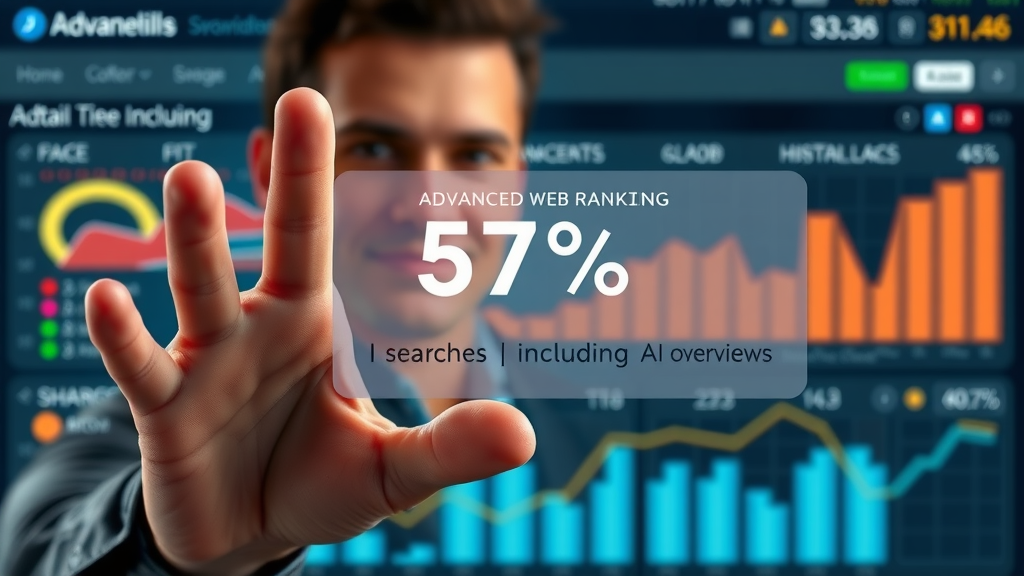Startling Statistic: Google's daily searches surged from 8.5 billion to 13.7 billion in less than a year, driven by AI-powered search features. But here’s the catch: ranking on page one no longer guarantees visibility. In today’s AI search era, brands must be cited in AI-generated summaries to truly be seen.
This article explores how AI search ranking is transforming search engines, why traditional SEO strategies fall short in the AI search era, and practical AI SEO strategies to position your brand as a trusted source. Join Neil Patel of NP Digital as he reveals how to win the new search game and leverage AI search ranking to skyrocket your brand’s authority and visibility.
Startling Growth in AI Search: The New Reality of Search Engines
The evolution of search engines into AI-powered answer machines is reshaping the digital landscape. Traditional searches have exploded in complexity and volume due to AI integration. According to Neil Patel, "Google is no longer just a list of links. It's a curated answer engine pulling from content the algorithm trusts."
Consumers now ask complete questions rather than simple keywords, expecting detailed, authoritative answers right on the results page. This phenomenon has led to a dramatic surge in question-based queries, skyrocketing from 38% to 87% over eight months. Concurrently, total daily Google searches increased by over 60%, reaching approximately 13.7 billion searches per day. This massive growth creates more opportunities for brands to capture attention through the AI layers of search.

Dynamic graph illustrating surging daily Google searches and question-based query growth, reflecting the new trends in AI search ranking
Understanding AI Overviews and Their Impact on AI Search Ranking
At the heart of AI search ranking lies the concept of AI overviews: concise summaries generated by advanced AI models that deliver quick answers drawn from trusted content sources. Contrary to popular belief, AI overviews do not dominate every search but appear selectively based on user intent. Neil Patel explains, "AI overviews are showing up exactly where intent is the highest — when people are researching, comparing, or about to make a decision."
By analyzing Google's search volume across key types—informational, commercial, navigational, and transactional—we find that AI overviews show up most frequently for high-intent informational and commercial queries. Informational searches account for nearly 46% of AI overviews, while commercial queries see AI overview inclusion in 18% of cases. This selective appearance highlights AI’s strategic focus on moments where customer decisions are forming.
|
|
|
Distribution of AI Overviews by Search Intent |
|
Search Intent |
Percentage of Total Searches |
AI Overview Presence (%) |
|---|---|---|
|
Informational |
~45.9% |
45.9% |
|
Commercial |
14.8% |
17.8% |
|
Navigational |
34.6% |
1.5% |
|
Transactional |
8% |
6.1% |

Advanced Web Ranking dashboard showing 57% of searches including AI overviews as of June 27, 2025
AI Mode: The Next Evolution in AI Search Ranking and Search Results
How AI Mode Changes the Search Engine Landscape
AI mode elevates the search experience by replacing traditional search results pages with conversational AI outputs, revolutionizing how users interact with modern AI search engines. Instead of providing a list of links, Google's AI synthesizes answers through complex multi-layered query fanout, running dozens of subsearches behind the scenes to deliver comprehensive, conversational responses.
Neil Patel highlights this evolution, stating, "This isn’t about ranking anymore. It’s about becoming the source Google’s AI trusts to summarize the buying journey." In AI mode, visibility depends on semantic positioning and the AI’s trust in your brand as the go-to source for relevant, trustworthy content rather than traditional keyword rankings.

Futuristic AI search interface showing multi-layered query fanout process exemplifying AI search ranking dynamics
Why Traditional SEO Strategies Fall Short in AI Search Engines
Traditional SEO focuses heavily on keyword rankings and link building, but these traditional SEO approaches lose relevance in the evolving AI search engine and generative engine optimization landscape. Google's AI no longer prioritizes keyword stuffing or page rank alone; it prioritizes brand authority and trustworthiness . Content must be semantically rich and trustworthy to be cited by AI-generated answers.
This shift demands marketers to adapt from chasing page rankings to building brand recognition and influence throughout the AI search ecosystem. The underlying goal is now to become the trusted source Google’s AI relies on — a far different game from yesterday's SEO tactics.

Marketers reviewing outdated keyword tracking charts, symbolizing why traditional SEO strategies fall short in AI search ranking
The Shift from Ranking to Brand Authority in AI Search Ranking
Neil Patel famously compares modern SEO to "a billboard on the freeway or a sponsor logo on a Formula 1 car," emphasizing that brand recognition and AI SEO authority now matter more than immediate clicks in AI search results. The AI search ecosystem cites trusted brands as a news anchor cites sources—providing exposure even without direct user interaction.
This means investing in brand equity and visibility has become crucial to success in the new AI search ranking landscape. Building this authority ensures your brand remains front-of-mind as consumers move through the customer journey.

Animated concept of brand logo appearing in an AI-generated results carousel, representing brand authority in AI search ranking
How to Reverse Engineer AI Search Ranking to Get Your Brand Cited
To thrive in the AI-driven search environment, brands must learn how to get cited within AI overviews and AI mode answers, optimizing their content for effective AI SEO and AI search ranking. The key is to understand where Google’s AI currently pulls information from and then build your content to compete for those spots.
Neil Patel recommends leveraging tools like UberSuggest to analyze competitors' SEO pages and identify high-value topics you are missing. This reverse-engineering strategy unlocks actionable insights:
-
Enter competitor domain in UberSuggest to view top SEO pages and backlinks.
-
Analyze the most visited pages and the keywords responsible for driving traffic.
-
Use the keyword gap feature to discover high-value topics your brand isn’t covering yet.
-
Create richer, multimedia content targeting those keywords to become the AI’s trusted source.

Professional marketer researching SEO competitors on a dual monitor setup, utilizing UberSuggest to enhance AI search ranking strategy
As you refine your approach to AI search ranking, it's also valuable to explore how Google's evolving features—like follow-up search—can further influence customer engagement and visibility. For a deeper dive into leveraging these advancements, consider reviewing how Google’s follow-up search feature can become a strategic asset for winning customers in 2025 .
Creating Content That Gets Cited in AI Search Results
Producing content that ranks in AI search results goes beyond writing lengthy blog posts. Google’s AI search increasingly values a multi-format, multimedia approach that caters to different learning styles and speeds of consumption, enhancing AI search results and AI search ranking visibility. Videos, images, infographics, and diagrams enrich user experience and increase the likelihood your content will be cited.
By pairing rich multimedia content with strategically chosen keywords derived from competitor gap analysis, your brand can transform from just another webpage into the authoritative voice Google AI selects to answer complex queries. It's these multi-layered content ecosystems trusted by AI that drive real long-term customer demand.

Engaging multimedia content layout incorporating videos and infographics, designed to enhance AI search ranking
What You'll Learn: Key Takeaways on AI Search Ranking
-
AI search ranking demands brand citation, not just page one ranking.
-
AI overviews and AI mode prioritize user intent and trustworthiness.
-
Semantic positioning and multi-format content are critical for AI visibility.
-
Tools like UberSuggest help identify keywords favored by AI.
-
Building brand authority within AI search leads to sustainable long-term visibility.

Happy team celebrating SEO visibility success with growing brand citations in AI search ranking
People Also Ask: FAQs on AI Search Ranking
Which AI search engine is best?
Currently, Google leads as the top AI search engine with its AI-enhanced search capabilities, combining traditional Google search with AI overviews and AI mode to deliver comprehensive AI search results. Alternative engines like Bing and emerging AI-first platforms are improving but Google’s vast data and AI integrations keep it at the forefront of AI search ranking .
Who is leading AI research?
Tech giants like Google, OpenAI, Microsoft, and Meta dominate AI research. Google’s dedicated AI teams continuously innovate in natural language processing and search technologies, shaping the future of AI-powered search engines and setting industry standards for AI search ranking.
How to rank for AI search?
Ranking for AI search requires focusing on semantic relevance, brand authority, and leveraging advanced AI SEO techniques to become a trusted source in AI search engines. Creating comprehensive, multimedia-rich content optimized for user intent and leveraging tools like UberSuggest to identify keyword gaps are critical to becoming a trusted source for AI-driven summaries and answers.
What is the best AI for job search?
Specialized AI platforms like LinkedIn’s AI-powered job recommendations and emerging AI job search assistants offer personalized insights. While Google’s AI search helps broadly, niche AI job engines are tailored for effective job discovery aligned with career goals.
Conclusion: Embracing AI Search Ranking to Future-Proof Your Brand
In this new era of AI-enhanced search engines, including advanced AI search engines, the rules of search engine optimization and generative engine optimization have fundamentally changed. Ranking on page one is no longer sufficient; your brand must be cited in AI-generated results to secure visibility. Neil Patel concludes, "The smart brands realize Google's AI features aren’t taking visibility away; they’re redistributing it to sources Google trusts most."
By understanding the mechanics of AI search ranking , reverse engineering trusted content sources, and creating rich, authoritative multimedia content, your brand can capture this emerging opportunity. Don’t wait for competitors to outpace you — adapt now and lead your market in the AI search revolution.
If you’re ready to take your digital strategy even further, consider exploring the fundamentals of first-party data acquisition. Building a robust data foundation not only strengthens your brand’s authority in AI search but also unlocks new levels of personalization and customer insight. Contact us at Digital Marketing All and discover how to harness this powerful asset and position your brand for long-term success in the evolving digital landscape.
 Add Row
Add Row  Add
Add 








Write A Comment